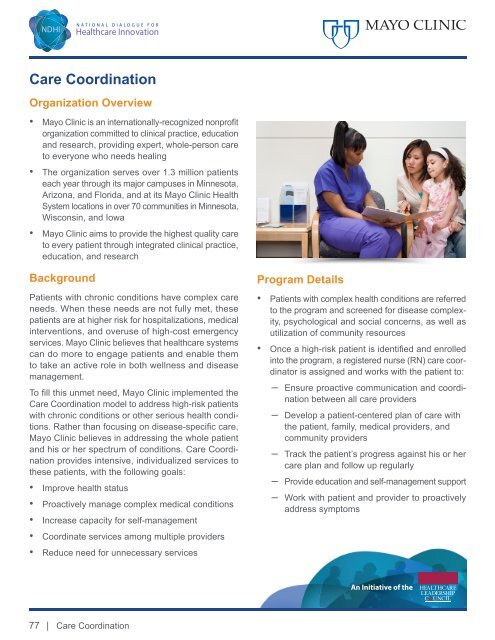VIable
HLCCompendium
HLCCompendium
Create successful ePaper yourself
Turn your PDF publications into a flip-book with our unique Google optimized e-Paper software.
NDHI<br />
NAT IONAL DIALOGUE FOR<br />
Healthcare Innovation<br />
Care Coordination<br />
Organization Overview<br />
• Mayo Clinic is an internationally-recognized nonprofit<br />
organization committed to clinical practice, education<br />
and research, providing expert, whole-person care<br />
to everyone who needs healing<br />
• The organization serves over 1.3 million patients<br />
each year through its major campuses in Minnesota,<br />
Arizona, and Florida, and at its Mayo Clinic Health<br />
System locations in over 70 communities in Minnesota,<br />
Wisconsin, and Iowa<br />
• Mayo Clinic aims to provide the highest quality care<br />
to every patient through integrated clinical practice,<br />
education, and research<br />
Background<br />
Patients with chronic conditions have complex care<br />
needs. When these needs are not fully met, these<br />
patients are at higher risk for hospitalizations, medical<br />
interventions, and overuse of high-cost emergency<br />
services. Mayo Clinic believes that healthcare systems<br />
can do more to engage patients and enable them<br />
to take an active role in both wellness and disease<br />
management.<br />
To fill this unmet need, Mayo Clinic implemented the<br />
Care Coordination model to address high-risk patients<br />
with chronic conditions or other serious health conditions.<br />
Rather than focusing on disease-specific care,<br />
Mayo Clinic believes in addressing the whole patient<br />
and his or her spectrum of conditions. Care Coordination<br />
provides intensive, individualized services to<br />
these patients, with the following goals:<br />
• Improve health status<br />
• Proactively manage complex medical conditions<br />
• Increase capacity for self-management<br />
• Coordinate services among multiple providers<br />
• Reduce need for unnecessary services<br />
Program Details<br />
• Patients with complex health conditions are referred<br />
to the program and screened for disease complexity,<br />
psychological and social concerns, as well as<br />
utilization of community resources<br />
• Once a high-risk patient is identified and enrolled<br />
into the program, a registered nurse (RN) care coordinator<br />
is assigned and works with the patient to:<br />
––<br />
Ensure proactive communication and coordination<br />
between all care providers<br />
––<br />
Develop a patient-centered plan of care with<br />
the patient, family, medical providers, and<br />
community providers<br />
––<br />
Track the patient’s progress against his or her<br />
care plan and follow up regularly<br />
––<br />
Provide education and self-management support<br />
––<br />
Work with patient and provider to proactively<br />
address symptoms<br />
An Initiative of the<br />
77 |<br />
Care Coordination


